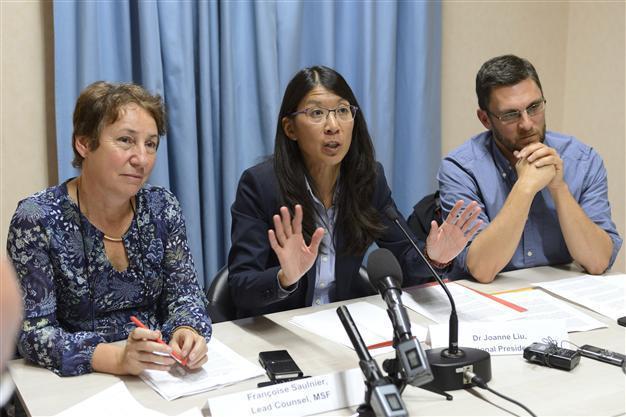MSF demands international probe into deadly Kunduz air strike
KABUL - Agence France-Presse

Francoise Saulnier, Medecins Sans Frontieres, MSF, lead counsel, Joanne Liu, President of MSF International, and Bruno Jochum, Director General of MSF Switzerland, from left to right, attend a news conference on the US air strike on a hospital in Kunduz, Afghanistan, in Geneva, Switzerland, Wednesday, Oct. 07, 2015. AP Photo
Medical charity MSF Oct. 7 demanded an international probe into a deadly US air strike on an Afghan hospital, after reports said NATO's top regional commander thought American forces broke their own rules of engagement.Three separate investigations -- by the US military, NATO and Afghan officials -- are currently under way into Saturday's catastrophic strike in the northern Afghan city of Kunduz.
But the charity, which condemned the attack as a war crime, stressed the need for an international inquiry, saying the bombing raid that killed 22 people was in contravention of the Geneva Conventions.
"We cannot rely on an internal military investigation," Doctors Without Borders (MSF) chief Joanne Liu told reporters in Geneva, insisting that an "international humanitarian fact-finding commission" should probe the bombing.
"This was not just an attack on our hospital, it was an attack on the Geneva Conventions. This cannot be tolerated," Liu said.
Oct. 3 raid sparked international outrage, fuelled by claims that patients had burned to death as they lay in their beds.
Liu's remarks come a day after General John Campbell, the top US and NATO commander in Afghanistan, said the "hospital was mistakenly struck" when Afghan officials called for the raid.
But MSF brushed aside that explanation, saying "a mistake is not an answer for us" and insisting on knowing "the facts, the intention, the criteria" behind the more than hour-long raid.
Campbell's admission was the latest in a series of shifting explanations the Americans have offered for the strike, which have ranged from dubbing the bombing "collateral damage" to saying it was carried out to protect US troops.
International aid groups, the United Nations and a growing tide of global revulsion have added to the pressure on Washington to come clean over the strike, which came days after the Taliban overran Kunduz.
The New York Times on Oct. 6, citing officials close to Campbell, said US special forces in Kunduz were unable to verify whether the hospital was a legitimate target before the bombs were dropped.
"Obviously, the investigation is still under way, but Campbell's thinking now is that the Americans on the ground did not follow the rules of engagement fully," the report quoted one of those officials as saying.
But the official stressed that no final conclusions had been reached and a formal inquiry could yield a different conclusion.
Under US rules of engagement, air strikes are called in to eliminate insurgents, protect American troops and assist Afghans who request air support.
But the US special forces on the ground most likely did not ensure the required strike met any of those criteria, Campbell said in private discussions with his colleagues, according to the report.
In testimony to the US Congress on Oct. 6, Campbell stressed that while it was the Afghans who called for the strike, ultimately the decision to launch rested with Americans.
His remarks provoked no immediate response from Afghan officials, but they have previously claimed that insurgents were using the hospital as a position to target troops and civilians.
A Taliban official told AFP that militants visited the hospital to reassure staff that they would not be harmed but left the facility 12 hours before the bombing.
Campbell has urged Washington to consider boosting its post-2016 military presence to repel a Taliban upsurge and stabilise a "tenuous security situation" in the war-ravaged nation.
The White House is reviewing whether to press ahead with plans for the final exit of US troops by late 2016, the end of Barack Obama's presidency, and leave an embassy-based force of about 1,000 in Afghanistan.
Afghanistan is at "a decisive point" given the surge in violence, Campbell said, noting the growing presence of Islamic State of Iraq and the Levant (ISIL) and Al-Qaeda fighters in Afghanistan.
US forces in Afghanistan currently stand at about 9,800. Campbell said Obama has provided him with "flexibility" to slow the drawdown.
















